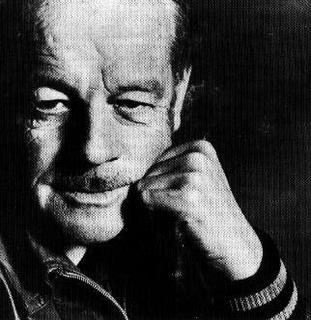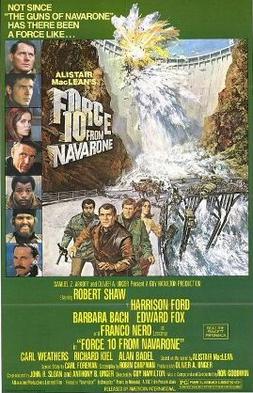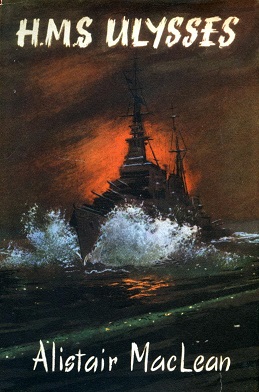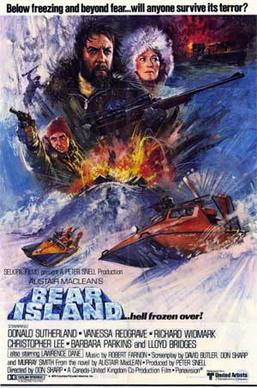
Alistair Stuart MacLean was a Scottish novelist who wrote popular thrillers and adventure stories. Many of his novels have been adapted to film, most notably The Guns of Navarone (1957) and Ice Station Zebra (1963). In the late 1960s, encouraged by film producer Elliott Kastner, MacLean began to write original screenplays, concurrently with an accompanying novel. The most successful was the first of these, the 1968 film Where Eagles Dare, which was also a bestselling novel. MacLean also published two novels under the pseudonym Ian Stuart. His books are estimated to have sold over 150 million copies, making him one of the best-selling fiction authors of all time.

Ice Station Zebra is a 1963 thriller novel written by Scottish author Alistair MacLean. It marked a return to MacLean's classic Arctic setting. After completing this novel, whose plot line parallels real-life events during the Cold War, MacLean retired from writing for three years. In 1968 it was loosely adapted into a film of the same name.

Force 10 from Navarone is a 1978 British war film loosely based on Alistair MacLean's 1968 novel of the same name. It is a sequel to the 1961 film The Guns of Navarone. The parts of Mallory and Miller are played by Robert Shaw, and Edward Fox, succeeding in the roles originally portrayed by Gregory Peck and David Niven. It was directed by Guy Hamilton and also stars Harrison Ford, Carl Weathers, Barbara Bach, Franco Nero, and Richard Kiel.

HMS Ulysses was the debut novel by Scottish author Alistair MacLean. Originally published in 1955, it was also released by Fontana Books in 1960. MacLean's experiences in the Royal Navy during World War II provided the background and the Arctic convoys to Murmansk provided the basis for the story, which was written at a publisher's request after he'd won a short-story competition the previous year.
Elliott Kastner was an American film producer, whose best known credits include Where Eagles Dare (1968), The Long Goodbye (1973), The Missouri Breaks (1976), and Angel Heart (1987).

Circus is a novel written by the Scottish author Alistair MacLean. It was first released in the United Kingdom by Collins in 1975 and later in the same year by Doubleday in the United States.

When Eight Bells Toll is a first-person narrative novel written by Scottish author Alistair MacLean and published in 1966. It marked MacLean's return after a three-year gap, following the publication of Ice Station Zebra (1963), during which time he had run several restaurants.

The Golden Rendezvous is a novel written by Scottish author Alistair MacLean, and was first published in 1962. One of MacLean's most popular works, it combines mystery, suspense, action, clever bluffs and double bluffs, with MacLean's trademark self-deprecating wit.

Athabasca is a novel by Scottish author Alistair MacLean, first published in 1980. As with the novel Night Without End, it depicts adventure, sabotage and murder in the unforgiving Arctic environment. It is laid in the oilfields and oil sands fields of Alaska and Canada and includes a considerable amount of technical detail on the operations.

The Golden Gate is a novel written by the Scottish author Alistair MacLean. It was first released in the United Kingdom by Collins in 1976 and later in the same year by Doubleday in the United States.

The Way to Dusty Death is a thriller novel written by Scottish author Alistair MacLean. It was originally published in 1973. The title is a quotation from the famous soliloquy in Act 5, Scene 5 in Shakespeare’s play Macbeth.

Caravan to Vaccarès is a novel by author Alistair MacLean, originally published in 1970. This novel is set in the Provence region of southern France. The novel was originally written as a screenplay for producer Elliot Kastner.

The Last Frontier is a 1959 novel written by Scottish author Alistair MacLean. It was released in the United States under the title The Secret Ways. This novel marks MacLean's first foray into the espionage thriller genre, and was inspired by the events surrounding the Hungarian Revolution of 1956.

When Eight Bells Toll is a 1971 action film directed by Étienne Périer and starring Anthony Hopkins, Jack Hawkins, Robert Morley, and Nathalie Delon. Set in Scotland, it is based upon Scottish author Alistair MacLean's 1965 novel of the same name. Producer Elliott Kastner planned to produce a string of realistic gritty espionage thrillers to rival the James Bond series, but the film's poor box office receipts ended his plans.

Goodbye California is a novel by Scottish author Alistair MacLean, first published in 1977.

Bear Island is a 1979 thriller film based on Alistair MacLean's 1971 novel of the same name. It was directed by Don Sharp, and starring Donald Sutherland, Vanessa Redgrave, Richard Widmark, Christopher Lee and Lloyd Bridges.

The Hostage Tower is a 1980 American spy and thriller television film starring Peter Fonda and Douglas Fairbanks Jr., and directed by Claudio Guzmán, well known for his work in sitcoms. It is based on a story by Alistair MacLean. A book based on MacLean's story by John Denis was the first in the series of UNACO books.
Novelists, screenwriters and filmmakers have set their works in Svalbard, an archipelago in the Arctic, the northernmost part of Norway yet closer to Greenland. Such works often make use of its Arctic climate, polar bears, isolation and the natural beauty of its dominant glaciers, mountains and fjords.

The Riddle of the Sands is a 1979 British spy thriller cinema film based upon the novel of the same name written by Erskine Childers. Set in 1901, and starring Michael York, Simon MacCorkindale and Jenny Agutter, it concerns the efforts of two British yachtsmen to avert a plot by the German Empire to launch a seaborne military invasion of the United Kingdom.

River of Death is a 1989 American action film written and directed by Steve Carver and starring Michael Dudikoff. It is based on the 1981 novel of the same name by Alistair MacLean.

















